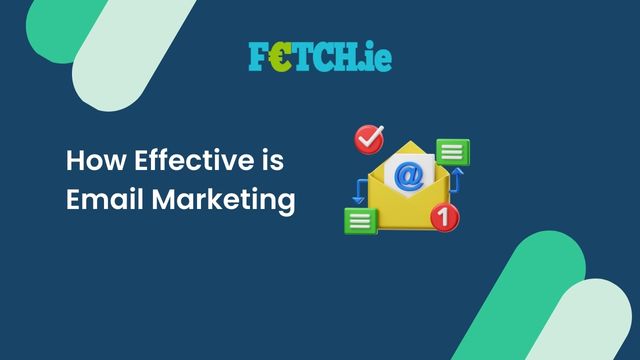Email marketing is a powerful tool for reaching and engaging customers and building relationships with them. It can help you promote your products and services, drive traffic to your website, and generate leads and sales. But how effective is email marketing?
There’s no denying that email marketing has come a long way since the early days of the internet. It’s now easier than ever for businesses to create and send targeted, personalised emails to their customers and prospects. We have found how effective it can be for small businesses, and it’s a great way to build a loyal customer base.
So, is email marketing effective? The short answer is yes. Studies have shown that email marketing can effectively reach and engage customers and drive profitable action. Here are a few key benefits of email marketing:
High ROI

One of the most significant benefits of email marketing is its high return on investment (ROI). According to a report published by Litmus, the average ROI for email marketing is €33 for every €1 spent. This is significantly higher than other forms of digital marketing, such as social media marketing and PPC advertising.
Targetting

Email marketing allows you to send targeted and personalised messages to your customers and prospects. You can segment your email list based on various factors, such as demographics, location, interests, and behaviour, and send targeted emails to specific audience segments. This allows you to create more relevant and personalised messages that are more likely to engage and convert your audience.
For example, if you have an online pet shop, you can create an email list for people with dogs and send them monthly emails on dog products and offers. You can do this for other pets, such as cats, birds and more.
Segmenting Email Marketing Lists
Segmenting your email marketing lists can tailor your message to your audience’s specific needs and interests. The following are a few ways you can segment your lists today:
Demographics: You can segment your email list based on demographic factors, such as age, gender, location, and income. This can be especially useful if you offer different products or services to different demographics.
Interests: You can segment your email list based on your subscribers’ interests. For example, if you have a sports clothing store, you might segment your list into categories like “running,” “cycling,” and “yoga” and send targeted emails to each segment based on their interests.
Behaviour: You can segment your email list based on the actions or behaviours of your subscribers. For example, you might create a segment for people who have purchased from your store or a segment for people who have abandoned their shopping carts. You can then send targeted emails to these segments to try and convert them into customers.
Lifecycle stage: You can segment your email list based on where people are in the customer lifecycle. For example, create separate segments for new subscribers, leads, customers, and inactive subscribers and send targeted emails to each segment based on their stage in the lifecycle.
Measurable

Email marketing is also highly measurable. You can track key metrics with the right email marketing software, such as open rates, click-through rates, and conversions. This allows you to see how well your emails perform and make data-driven decisions about your email marketing strategy.
Cost-Effective

Email marketing is also a cost-effective way to reach and engage customers. While there are costs associated with email marketing, such as the cost of email marketing software and the time and resources required to create and send emails, it’s generally much cheaper than other forms of marketing, such as direct mail or print advertising.
Versatile

Email marketing is a versatile tool that can be used for a variety of purposes. You can use it to promote your products and services, drive traffic to your website, generate leads and sales, and build customer relationships. You can also use email marketing to nurture leads, onboard new customers, and retain existing customers.
Conclusion
Despite these benefits, email marketing is not a magic bullet. It’s important to remember that email marketing is just one part of a larger marketing strategy. It should be used with other tactics, such as social media marketing, content marketing, and SEO.
In conclusion, email marketing can effectively reach and engage customers and drive profitable action. By understanding the benefits and limitations of email marketing, you can create a successful email marketing strategy that helps you achieve your marketing goals.
We have seen how effective it is for small and larger businesses, so if you operate online, you need to make the most of email marketing.
FAQs on Email Marketing
Here are a few tips for making your email marketing more effective:
– Segment your email list and send targeted, personalised messages
– Use subject lines and headers that grab attention and encourage opens
– Make your emails mobile-friendly
– Use a clear and compelling call-to-action
– Test and optimise your emails to improve performance
The following are some popular email marketing software options:
– Mailchimp
– ConvertKit
– AWeber
– Constant Contact
– GetResponse
